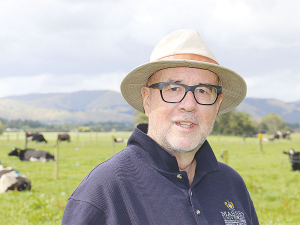NZ Catchment Groups Thrive with ‘Source to Sea’ Approach
The most successful catchment groups in NZ are those that have 'a source to sea' approach.
 Massey University Professor Peter Kemp and a team of 30 people there have been researching the effects of plantain over several years.
Massey University Professor Peter Kemp and a team of 30 people there have been researching the effects of plantain over several years.
Massey University Professor Emeritus Peter Kemp and a team of 30 people there have been researching the effects of plantain over several years and the experimental plots were established at the university in 2019.
He says this includes designing an innovative drainage system that uses the soil structure on the farm to enable measurement of all the nitrogen leaching from each paddock.
Kemp says the great thing is that the trial site allows the results to be directly transferable to current farming systems in NZ.
“Importantly for farmers, transition to plantain pastures results in no loss of production, while simultaneously reducing nitrogen leaching significantly from farms into freshwater,” he says.
Kemp says farmers have the choice of planting a number of paddocks in plantain or incorporating in with their clover and ryegrass, but he says mixing it in with other grass species ensures that farmers have it available all the time across their farm.
Plantain is essentially a diuretic, meaning it dilutes the urine coming out of the cow. Peter Kemp says the nutritive composition of plantain means that more of the N in the cow ends up in dung, which is a benefit to reducing N leaching. He says there is still more scientific research needed to better understand just how plantain works, especially around its persistence in the range of pastures around the country.
“A dairy farm is quite a complex system and so when you make a change to it there is a lot of science in understanding all the ramifications of that,” he says.
Glenn Judson is an animal nutritionist at Agricom which has developed Ecotain Plantain. He says research into plantain began back in the 1980s when it was still seen as a weed and was eventually developed into a quality pasture species. He says this took time as initially seed yields were poor and it took agronomists time to sort this out.
“What we did notice in a lot of our work was some really strange things, such as when we had pure strands of plantain, we could never find a urine patch near it. Also when we brought the animals into the yards, animals who had been grazing plantain seemed to be urinating a lot more than others. So it actually took us quite a long time to catch on to the fact that this plant had been doing something to the nitrogen cycle,” he says.
He says Agricom now realises they have a very powerful tool in the form of Ecotain. He says it brings resilience to pastures when it gets dry, it’s very good at passing on trace elements to animals and it has some effect in terms of animal parasites. But Judson says the most exciting factor is the environmental aspect which is that plantain promotes diuresis, the increased production of urine.
A Farmer's Perspective
Dannevirke dairy farmer Thomas Read is a strong advocate for plantain.
He runs 1,300 cows on a 500ha block and has been using it for the last eight years. He says he started looking at plantain after going through two droughts and was looking for slightly diverse pasture that would fit in with his system, was cost effective and was more drought tolerant.
He says as a result of this he incorporated plantain into his system and, as word got out about the environmental benefits, he joined the plantain working group and has been working with DairyNZ.
“I would recommend it to other farmers. The simplicity behind it, the fact that it integrates into your businesses, the cost effectiveness is great too – then there is the environmental benefit,” he says.
The Meat Industry Association of New Zealand (MIA) today announced that Chief Executive Officer Sirma Karapeeva has resigned from the role.
The winners of the 2026 Hawke’s Bay/Wairarapa Dairy Industry Awards were announced at the annual awards dinner held at Copthorne Solway Park in Masterton on Thursday evening.
Environment Southland is welcoming this week’s decision by the Environmental Protection Authority (EPA) to approve the release of Blaptea elguetai, a leaf‑feeding beetle that will help control the highly invasive Chilean flame creeper.
This March, the potato industry is proudly celebrating International Women’s Day on 8 March alongside the International Year of the Woman Farmer, recognising the vital role women play across every part of the sector — from paddocks and packhouses to research, leadership, and innovation.
Fruit trader Seeka posted a record profit and returns to shareholders in 2025.
Recent weather events in the Bay of Plenty, Gisborne/Tairawhiti, and Canterbury have been declared a medium-scale adverse event.
OPINION: Staying with politics, with less than nine months to go before the general elections, there’s confusion in the Labour…
OPINION: Winston Peters' tirade against the free trade deal stitched with India may not be all political posturing by the…